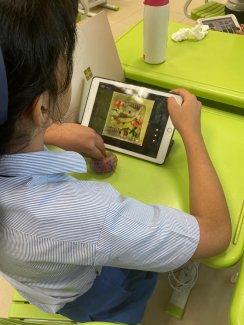Artikkelit

19.02.2025
Girls and women in STEM – views from Singapore
In the workplace, women often face barriers due to gender stereotypes that label certain jobs as more suitable for men. This issue is also present in Singapore, where traditional views still persist, and women are often seen as primary caregivers and men as breadwinners. These stereotypes impact women's representation in higher-paying, male-dominated STEM careers. Efforts to address these stereotypes are ongoing through educational initiatives. In Singapore, the Character and Citizenship Education (CCE) curriculum includes discussions on the equity of familial roles and gender stereotypes. Institutes of higher education also encourage women to pursue careers in STEM fields through STEM initiatives targeted for women.
Singapore tackles gender stereotypes in STEM through many ways, including policies and public awareness campaigns. In 2022, Singapore introduced a road map to further develop the country towards gender equality. The initiative, known as the White Paper, highlights barriers and challenges that hold women back and calls on Singaporeans to be conscious of gender stereotyping in their everyday actions. Minister for Communications and Information, Josephine Teo, stated that women still need Singaporeans' support in many ways. While many obstacles have been removed, further success can only be achieved if society as a whole works to shift mindsets. The 115-page White Paper outlines five main areas of focus, one of which is ensuring equal opportunities in the workplace. Addressing the gender gap in STEM careers is said to be crucial for Singapore as it affects the nation's creative output and human capital. Singapore ranks 4th in the 2024 Global Innovation Index.
Many top universities are active in public discourse in Singapore. In addition to various publications on their websites and STEM programs designed only for women, public discussions are held actively. For example, at a panel discussion at the National University of Singapore (NUS), panelists highlighted the critical need for early exposure to science and technology careers for girls. Initiatives like teaching computer science from kindergarten level, confidence building by encouraging girls to pursue tech-related activities, and overcoming social norms help address gender disparities. Another public discussion at Singapore’s Lifelong Learning Institute focused on the talent shortage. Despite women making up about 41% of Singapore's tech workforce, more educated women in the STEM field can help solve the workforce shortage, both locally and globally.
School curriculum addresses the stereotypes
In Singapore, students excel in both PISA and TIMMS assessments, but gender differences are evident. Data shows gender differences in STEM as students progress through education. Females are less likely to enroll in tertiary STEM programs (37.15%) compared to males (56.25%) and make up only 20% of R&D personnel in Singapore. For example, at Nanyang Technological University (NTU), women make up 56% of the student population but drop to 34% at the doctorate level and 26% at the postdoctoral level, while men increase from 44% to 74%. The underrepresentation is notable in engineering and IT fields.
The shortage of women in STEM is due to several factors. Motivational factors include interest or enjoyment of science and math, as well as external reasons like career opportunities. In Asian societies, external motivation is high but can undermine interest or enjoyment, causing pressure and tension. Research indicates that motivation is a key factor between gender and STEM career attainment. Singaporean boys are generally more motivated to study math and science than girls, viewing these subjects as more important to their lives. To tackle the motivational and gender-related issues, Singapore school follow Character and Citizenship Education (CCE) curriculum. This curriculum aims to foster values, character, social-emotional well-being, and citizenship dispositions among students. It addresses stereotypes, including those related to women and girls in science. Students learn to promote inclusivity and respect, challenging gender stereotypes and promoting gender equality. Schools often invite female scientists as role models and mentors to inspire and encourage female students to pursue careers in science.
Singapore do have excelling female research leaders
Despite the gender differences towards STEM being apparent from early ages, Singapore’s research and innovation hub attracts many women scientists. One of the most well-known women scientists is Professor Jackie Yi-Ru Ying, senior fellow and director of the Agency for Science, Technology and Research’s (A*Star) NanoBio Lab. Jackie Yi-Ru Ying is one of Singapore’s most prolific scientists, being the youngest full professor in the Department of Chemical Engineering at the Massachusetts Institute of Technology (MIT) at the age of 35. She currently has more than 200 primary patents and patent applications. The first Made-in-Singapore COVID-19 Rapid Test Kit was fully developed by her team.
In addition to biomedicine, women scientists are present in quantum computing as well. Ms. Yvonne Gao is a quantum physicist whose innovations in superconducting circuitry are recognized as crucial for scalable quantum computation. She is named as one of MIT Technology Review’s Innovators Under 35 in 2019 and has been awarded Singapore’s Young Scientist Award and a National Research Fellowship. As a principal investigator at the Centre of Quantum Technologies, she leads and mentors an international team of researchers. Ms. Yvonne is also a Presidential Young Professor at NUS, Singapore’s best-ranked university and the world's number eight university.
Text: Ella Suortti
Pictures: Ella Suortti & Mika Tirronen
More information:
• https://www.ntu.edu.sg/docs/default-source/default-document-library/powers/2022-1_ntu_powers_stemgendergapinsingapore.pdf
• https://singaporeglobalnetwork.gov.sg/stories/tech/discover-the-groundbreaking-work-of-8-female-scientists-in-singapore/
• https://www.straitstimes.com/singapore/spore-must-do-more-to-empower-women-to-pursue-stem-careers-heng-swee-keat
• https://www.moe.gov.sg/-/media/files/secondary/syllabuses/cce/2021-character-and-citizenship-education-syllabus-secondary.pdf
• https://www.straitstimes.com/singapore/mindset-shifts-needed-to-overcome-gender-stereotypes-white-paper
• https://www.straitstimes.com/tech/tech-news/women-can-help-ease-talent-crunch-in-cyber-security-industry-josephine-teo
• https://www.straitstimes.com/singapore/early-exposure-essential-to-draw-more-girls-into-science-tech-careers-panellists
